HOW TO USE PROTEIN POWDER: YOUR SIMPLE STEP-BY-STEP GUIDE
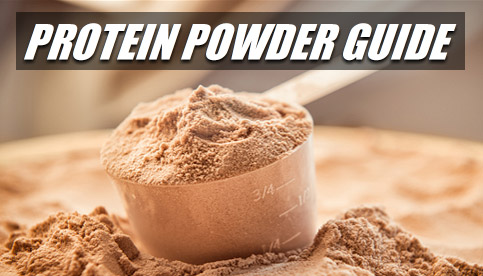
“What is the best protein powder to use?”
“How much protein powder should I take per day?”
“When is the best time to drink it?”
Most beginning lifters highly over-complicate the issue of proper protein powder use, typically viewing it as some sort of “high tech” muscle building supplement that must be consumed in a very specific way to obtain the benefits.
In reality, like the name implies, protein powders are nothing more than just that: powdered protein.
Whether it’s whey, egg, casein or a vegan source, all protein powders are ultimately derived from whole foods and are simply a means of meeting your daily protein needs in a more convenient way.
Rather than thinking of protein powders as being “supplements” in a category of their own, it’s actually more accurate to just think of them as regular food products.
For that reason, asking “how to use protein powder” is really no different from asking “how to use chicken” or “how to use beef”.
The use of a protein powder is simply an optional add-on to your diet, and it’s just a question of whether you prefer eating regular solid foods only as a way of obtaining your daily protein or if you enjoy the taste and convenience that protein powder shakes and recipes provide.
If you have decided to include a protein powder in your plan, this step-by-step protein powder guide will answer the 3 most common questions surrounding this topic:
- Which protein powder should you use?
- How much protein powder should you take daily?
- When is the best time to consume protein powder?
The answers to these questions are very simple and straightforward as you’re about to see, so let’s dive into it…
What Is The Best Protein Powder To Use?
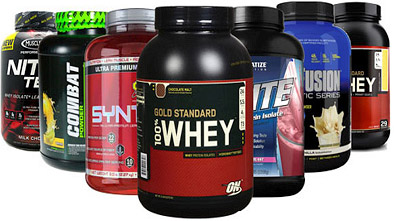
With literally thousands of different protein powders on the market to choose from, this can quickly become a confusing choice.
Especially when every company out there is hyping their product up as the best option available and giving an endless list of reasons as to why you’ll make better gains with their powder as opposed to another. But you have to choose protein power carefully because whey protein has side effects too.
However, here’s the simple truth when it comes to selecting a protein powder for your diet…
As long as you’re consuming enough total protein for the day as a whole (I recommend between 0.8-1g per pound of body weight) and from a variety of sources, the specific type of protein powder you use is not going to make any noticeable difference to your bottom line results.
This is because ALL forms of protein are ultimately broken down into their individual amino acid building blocks, and you’ll easily be getting enough of all the different aminos your body needs to max out its muscle building capabilities over any given day assuming sufficient protein quantity/variety is present.
Yes, certain types of protein powder like whey or egg are technically superior to certain other types such as brown rice or soy due to their superior amino acid profile on a gram for gram basis, but the differences in quality gradually become less and less important as the total amount of protein you consume throughout the day increases.
Your body can only build a limited amount of muscle over any specific time frame, and consuming more and more protein once that cap has been reached is not going to help you build muscle any faster.
For that reason, the particular type of protein powder that you use is really up to you and primarily just comes down to the issues of taste, texture and cost.
The most popular form of protein powder available is of course whey, and this is the form I generally recommend by default since it ranks well for taste, mixes easily, is cost-effective and has several other overall health benefits as well.
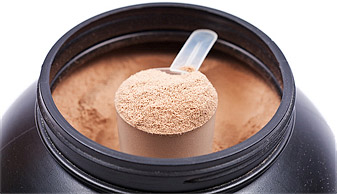
So, unless there is some specific reason why you can’t use whey protein or would prefer not to (for example, if you were vegan), then that’s the type I’d suggest going with.
In terms of whey protein selection, the two main types you’ll come across are whey protein concentrate and whey protein isolate.
Both are exactly the same in terms of their actual protein quality, the only difference being that whey isolate is a more heavily filtered form and will contain a higher percentage of protein per scoop (about 90% in comparison to the 70-80% that concentrates provide), fewer carbs/fat and will be virtually lactose free.
Whey isolates also tend to mix up more easily and will generally be a bit better tasting since they’re naturally blander and are easier to flavor.
However, given that the difference in carbs and fat is quite small (around 2-3 grams difference at the most) and that whey isolates are reasonably more expensive per serving, I’d only recommend purchasing a 100% whey isolate if you’re lactose intolerant or are currently on a cutting diet and want to absolutely minimize the carb/fat content.
For everyone else though, the best option is to go with a whey protein product that utilizes a blend of both whey isolate and whey concentrate.
That way you’ll still be getting a protein powder that mixes up easily, tastes good, contains minimal carbs/fat, but that is more cost effective than buying a 100% whey isolate.
There are a ton of high quality whey protein powders out there to choose from that meet this criteria, but here are 3 specific options that I personally use and recommend:
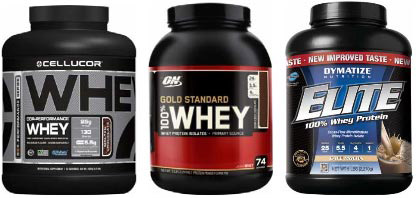
1) Optimum Nutrition 100% Whey
2) Dymatize Elite Whey
3) Cellucor COR-Performance Whey
In any case, whey protein powder selection essentially just comes down to taste, price and mixability, as there won’t be anything special about the actual protein content from one product to another.
The only other thing to make sure of is that your whey protein is not “amino spiked”, which is a common cost-cutting technique where companies add cheap free form amino acids into the powder (such as l-glycine, l-taurine or l-methionine) to artificially raise the protein totals on the label.
I won’t go into detail about that in this post as I’ve already covered it previously if you want more information: The “Amino Spiking” Scam.
Now, all that said, although whey protein is my “default” protein powder recommendation, it’s still not mandatory that you specifically use whey and if there’s a different form you’d prefer then that’s fine too.
Some other options include egg white protein powder or casein, or if you’re vegan or would just prefer a plant-based powder for some reason then you’ve got brown rice protein, pea protein, soy protein, hemp protein or vegan blends that combine a variety of different sources together.
Again, virtually any form of protein powder from a reputable company is ultimately fine as long as you’re consuming enough total protein for the day from a variety of sources.
Don’t fall for any of the over-hyped, over-priced “high tech” protein powders out there that promise dramatically superior muscle gains in comparison to other products, as this is nothing more than marketing B.S.
All proteins are broken down into basic amino acids in the end, and one specific type of powder is not going to deliver noticeabley better results over another assuming your overall diet as a whole is on point.
How Much Protein Powder Should You Take?
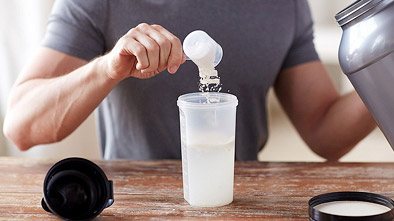
As I mentioned at the beginning of the post, given that protein powders are derived from whole foods, asking how much protein powder you should take really isn’t any different from asking how much salmon or how much turkey you should eat.
There’s no such thing as a set “protein powder dosage” that you must abide by, and it really just comes down to how much protein you prefer eating in solid form versus how much you’d like to have in liquid form or in the form of protein powder recipes.
That said, it is a good idea to make sure you’re consuming a variety of different protein sources throughout the day to ensure that all of your individual amino acid needs are being met, so I wouldn’t advise going overboard and having a majority percentage of your intake come from protein powder only.
As a rough guideline, having up to 50% of your total daily protein intake in the form of protein powder is acceptable, with the specific amount you consume being a matter of personal preference.
For most people, that’s going to mean anywhere from 1 scoop per day up to 3 or 4 scoops depending on body weight.
When Is The Best Time To Take Protein Powder?

Following the same theme here, protein powder timing is also just a matter of personal preference since there won’t be any special benefit to consuming it at one time of day over another.
If you enjoy using it for your pre-workout meal because it’s light and easy on your stomach then that’s fine.
If you typically aren’t hungry in the morning or post workout and would prefer a shake at that time, no problem.
If you have some sort of protein powder dessert recipe that you like having after dinner, go for it.
When it comes to daily protein intake, the central factor is simply making sure that your overall protein needs for the day as a whole are being met and ideally spacing it out into at least 3 separate feedings.
As long as you’re doing that, the question of “when to take protein powder” is a non-issue and is totally up to you.
How To Use Protein Powder: Quick Recap
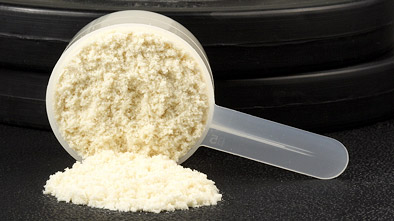
As I mentioned at the outset, the issue of proper protein powder use is incredibly simple and not something that should be over-anayzed.
Protein Powder Guide Recap:
1) Any type of protein powder is ultimately fine as long as you’re meeting your overall protein intake for the day from a variety of sources, and the decision should simply be based on taste preference and cost. That said, my default recommendation is to go with a blend of whey isolate and whey concentrate.
2) You can consume any amount of protein powder per day up to approximately half of your total protein intake. The specific amount you consume should simply be based on what you prefer in terms of taste and convenience.
3) Protein powder timing won’t make any significant difference to your results, and you can take it at any time of day when it fits best into your overall diet.
When it all comes down to it, these powders are just another form of protein to include in your diet like any other, and for that reason they don’t require any special treatment.
They aren’t going to “super charge” your muscle building or fat burning results in any noticeable way, and they’re simply an optional addition to your program with the primary benefit merely being one of taste and convenience.
If you found this article helpful, make sure to sign up for your FREE custom fitness plan below...




